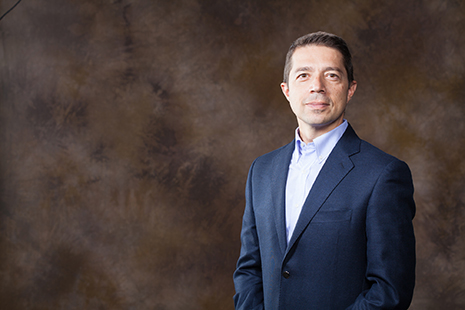FAYETTEVILLE, Ark. – Even when young players have water available while practicing soccer, they still became dehydrated, a University of Arkansas researcher found in a field study in Greece. Stavros Kavouras, an assistant professor of exercise science, said the findings have implications for athletes everywhere of all ages, including the Arkansas football players who will start fall practice soon.
Every year, high school football players begin fall practice in Arkansas in August, the hottest month of the year. Dehydration is one factor coaches and athletic trainers should try to monitor closely, according to Kavouras’ research.
Kavouras was the principal investigator who measured the initial hydration status of 107 boys between the ages of 11 and 16 on the second day of a summer sports camp. Of those, 72 of the young soccer players agreed to be monitored during two more training sessions during the camp.
The researchers calculated dehydration via changes in body weight. The boys were allowed to drink water whenever they wanted. Hydration status was also assessed by urine color and a lab test called urine specific gravity that measures the concentration of all chemical particles in the urine.
The study found that 95 of 107 of the players were “hypohydrated,” a condition caused by chronic dehydration, before the practice. The researchers found that nearly 96 percent of the players who agreed to be monitored were dehydrated after the training session on the third day and about 97 percent were dehydrated after the fifth day of training. Volunteers in the study had free access to water, but the researchers did not encourage them to drink it.
“These kids start training hypohydrated, and they do not drink enough during training, inducing even greater hypohydration,” Kavouras said.
He published a paper on the findings with five of his former colleagues in the department of nutrition and dietetics at Harokopio University in Athens, Greece. The paper appeared in the June edition of the International Journal of Sport Nutrition and Exercise Metabolism.
It is well documented that dehydration increases physiological strain and perceived effort to perform the same exercise task and this is accentuated in warm weather, according to the researchers. The majority of published research has been performed with well-trained adults exercising in the heat, but little information is available concerning children exercising under similar environmental conditions.
This study suggests that the knowledge of the importance of drinking water is not by itself effective in changing behavior.
“Constant efforts must be made by athletic trainers, coaches and athletes to enhance hydration,” Kavouras said.
The study also found that the degree of exercise-induced hydration was not influenced by the players’ hydration status before they started exercising. This indicates that thirst may not be an effective signal to prevent further dehydration in already-dehydrated young athletes.
In a study on a related topic, Kavouras and two colleagues found that even a small degree of hypohydration, set at less than 2 percent of body weight, can reduce exercise performance and increase heat strain on adult cyclists.
Topics
Contacts
Stavros Kavouras, assistant professor of exercise science
College of Education and Health Professions
479-575-5309,
Heidi Wells, content writer and strategist
Global Campus
479-879-8760,
